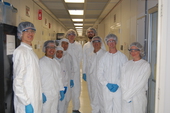Highlight
IGERT-Lifechips Summer Bootcamp
Achievement/Results
NSF Funded IGERT-Lifechips program continued with the second summer BootCamp workshop which is a high-intensity short course that explains the basic Lifechips concepts and introducing them to various researches in micro-engineering and experimental biology. The Bootcamp course consists of a two-week training and experience with Lifechips faculty members. For this summer Bootcamp, we had 6 students for the course: Amy Van Deusen from Anatomy and Neurobiology, Antonio Davila from Biological Chemistry, Christopher Dunckle from Physics and Astronomy, Isaac Janson from Chemical Engineering and Materials Science, Roger Shih from Biomedical Engineering, and Sean Seefeld from Chemistry.
For the first week, there were orientation about microfabrication in the cleanroom, this effort was supported by the Integrated Nanosystems Research Facility, presented by Lifechips faculty Mark Bachman. Following the orientation was the demonstration of some microfabrication processes. This was a great effort because students had a chance to go into the cleanroom and learned a lot about materials, tools, and process techniques. For instance, they learned to pattern on silicon wafers using soft lithography and making mold of the pattern with PDMS. The experiences they gain here are very valuable because for some of them, this was their first time having some hands-on experience with microfabrication.
The following days for the first week, we had Lifechips faculty members and a project scientist giving lectures and demonstrations of their labs and research projects. We had Professor John Porter, a project scientist of CalIT2, giving lecture and training on the Scanning Electron Microscope (SEM) and demonstrations on EVO and Environmental SEM in fully Saturated Mode. Next, we had Professor Phil Collins from Physics and Astronomy giving lectures and training on Computer Instrumentation in his lab; this was part 1. The following day, we had D. Ed Nelson from the department of Medicine and Hematology/Oncology giving lecture and demonstration on Flow Cytometry and Imaging. On the last of the first week, we had Professor Phil Collins give part 2 of his lecture and training on Computer Instrumentation, where students learned different programs for measuring/calculating research data.
The second week of the Bootcamp was arranged differently from the first week to provide the students with more valuable experiences. Our focus was to have the participation from both the students and their advisors. Each day of the second week, we paired up each Lifechips fellow and his/her advisor to give a presentation of or demonstration of their lab or current research project. For instance, Professor Abe Lee and Lifechips fellow Roger Shih introduced their lab to the rest of the students and some of the tools and equipments and discussing about some of the projects they’ve done. As for other students and their advisors, they gave presentations and all together, the students get to learn much more about the multidisciplinary research topics.
The summer Bootcamp packed with immersion experience that they will take with them as they get ready to expand into the research programs. Lifechips students were able to receive concentrated guidance and intensive interaction with each other, Lifechips faculty members, and their advisors.
Address Goals
Lifechips summer Bootcamp provided the students with opportunities to experience multi- and cross-disciplinary research by learning about basic microfabrication techniques, computer-aided tools for designing chips, basic biological sample collection and preparation methods, and data analysis. Lifechips summer Bootcamp’s main focus was to enhance the students’ ideas, visions, and potential directions for their research. Also, who is better to learn from than some of the leading cross-disciplinary researchers who are also members of the Lifechips program? Therefore, the knowledge that the students gain after the Bootcamp will help to aid them to the research interests of their choice.






















